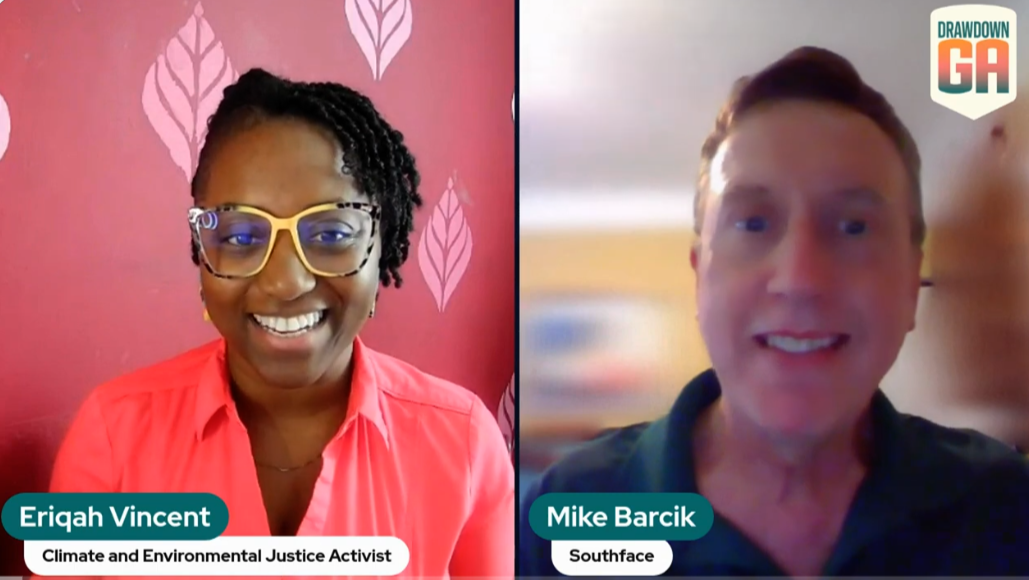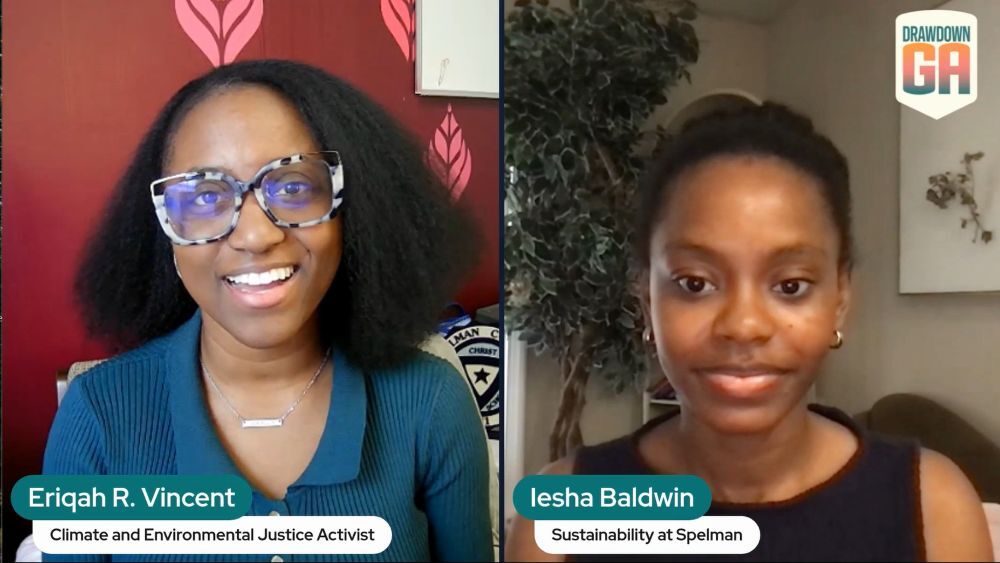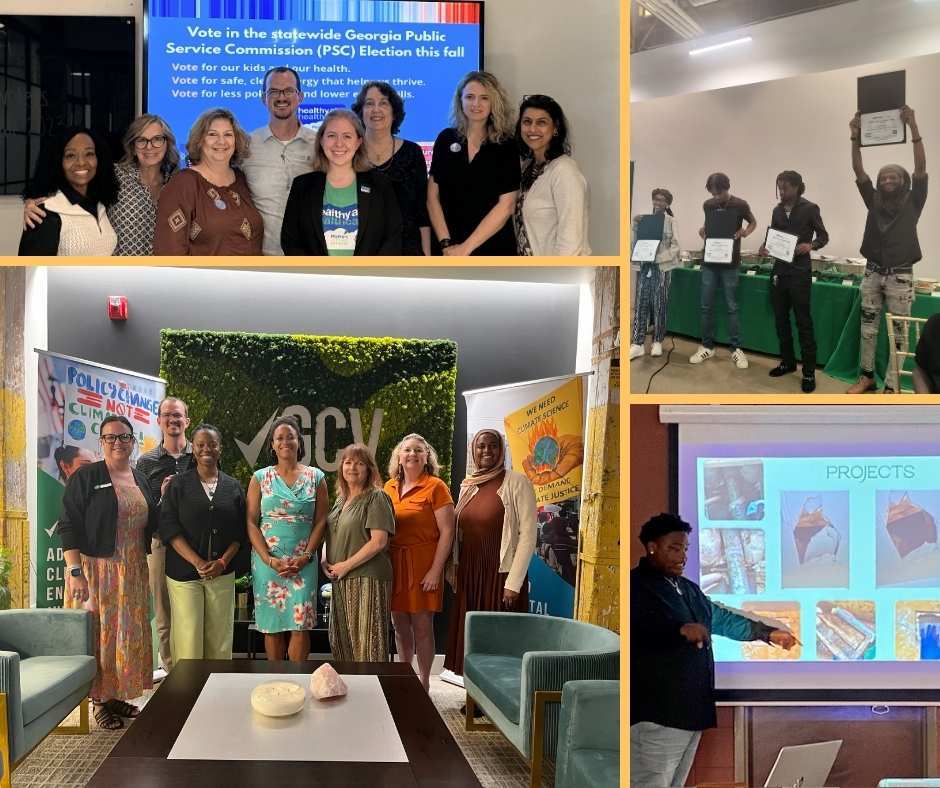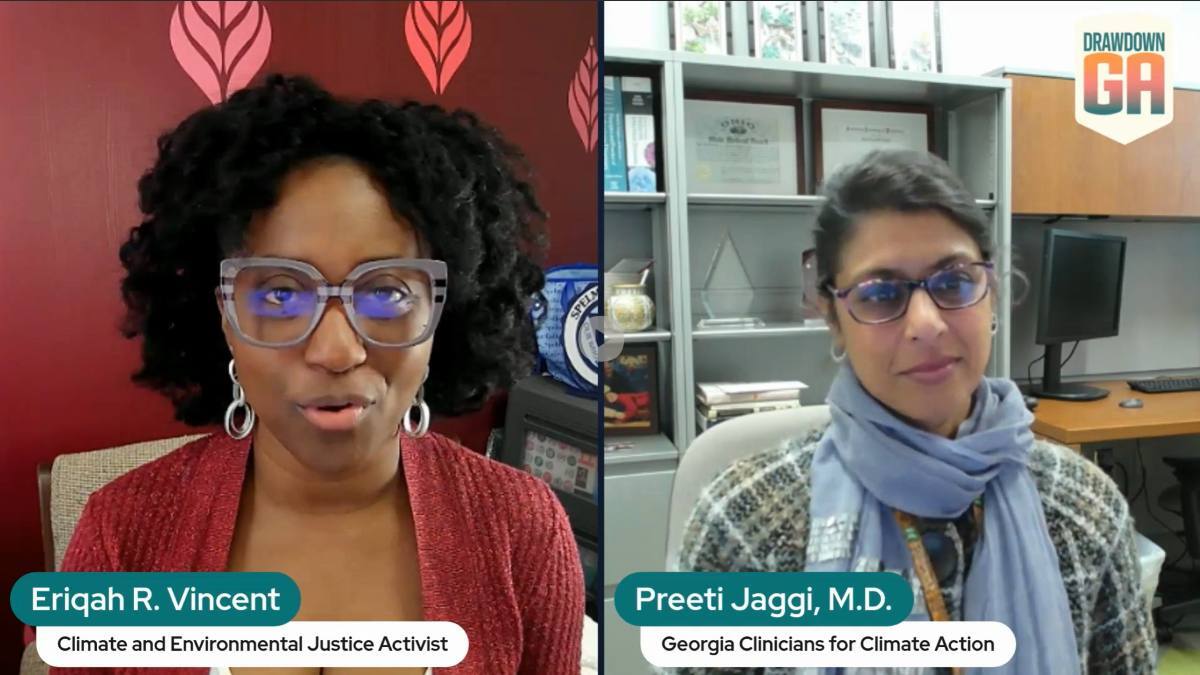Taking action on climate isn’t just about solar panels and EVs - some of the most impactful ways to reduce your carbon footprint include less visible actions, like improving the energy efficiency of your home. If you’re looking to get inspired to make efficient upgrades to your home, Mike Barcik of Southface is here to help.
In this interview in the Georgia Climate Digest video series, Eriqah Vincent of Drawdown Georgia speaks with Mike about his thoughts on climate and environmentalism, and what inspired his nearly 30-year career in HVAC, energy efficiency, and construction.
Mike also shares helpful perspectives for Georgia families interested in improving the energy efficiency of their homes.
Energy Efficiency Interview and Highlights
Highlights:
Mike speaks about why energy efficiency was an appealing field for a “pragmatic environmentalist.” [1:20 - 2:11]
Looking at the impact of high energy burdens and the work Southface is doing to improve equity and energy efficiency in Georgia. [9:45 - 12:05]
Reasons why Georgia families should take action to improve the efficiency of their homes. [27:30 - 28:22]
A lightly edited transcript follows:
Mike Barcik of Southface Discusses Energy Efficiency
Eriqah Vincent: Hi everyone. Thank you so much for joining us once again. My name is Eriqah Vincent and I'm excited to dig into the amazing work that you are doing. I'd love for you to tell us about yourself, and about the climate-related work that you do at Southface.
Mike Barcik: My background is actually mechanical engineering, and I have a focus on HVAC, energy efficiency, and construction. I've been at Southface for 29 years and I feel very fortunate, because mostly what I get to do these days is our technical training with professionals in our industry, like building designers, architects, engineers, code officials, contractors, and so on.
I'm a very pragmatic environmentalist. And really, one of the best things you can do for the planet is just to make the built environment better. That's why I love what I get to do.
We weatherize and improve the homes of seniors in our community. We focus on everything from air sealing and duct sealing to improving insulation and even small things like cleaning out dryer vents, LED lighting, and pipe insulation. This is all done as part of Decatur's three-day, Martin Luther King, Jr., service project, which I'm honored to have been a part of since the very beginning.
Eriqah: You mentioned your background was in engineering and HVAC. What brought you to energy efficiency specifically?
Mike: I've just always hated waste. It could be single-use plastic or somebody trying to heat an old building with a really inefficient furnace or something like that. Just throwing away money and throwing away resources really bothers me. And it concerns me because I have children. I think about how we have a finite amount of resources and what we are leaving behind, so to speak.
As you said, my background is in mechanical engineering and I enjoy building things. And so that was a natural connection to volunteering with Habitat for Humanity. Building affordable housing is a huge part of my personal life. That's where I met up with one of the founders of Southface, which changed my life. That connection set me on a path of being able to do what I enjoy, which is a big driver for me.
Eriqah: Why are you passionate about energy efficiency, specifically as a climate solution for Georgia?
Mike: Because the impact is just gigantic.
If you think about it, the way we use energy in this country can be divided roughly in thirds. About a third goes to transportation, about a third goes to industry, and the biggest third by far -- in fact, it's about 40% -- goes into commercial and residential buildings. So if you can improve the energy efficiency of our building stock, the impact in terms of carbon is huge.
But there are also a lot of other benefits.
Energy efficiency is not just about reducing your utility bill, but there's much greater comfort, improved health, and better indoor air quality. You create a more peaceful and quiet indoor environment. You have a building that is lower on maintenance and is more durable. So there are many benefits besides the more obvious one of addressing climate.
The Southface Legacy on Energy Efficiency in Georgia
Eriqah: What is something that might surprise us about the work that you do at Southface?
Mike: Southface has been around since 1978, but we're still kind of unknown. We work mostly in the Southeast, but we've done work in literally every state and some other places as well. We've created some programs and certifications that I personally have been involved in and are nationally known, but a lot of people don't know they actually started right here at Southface.
For example, we created a certification for professionals who test the leakage of your house and ductwork. That certification is used by the energy code and has been adopted by many states around the country.
Twenty-five years ago, Southface partnered with the Atlanta Homeowners Association, and we created the EarthCraft family of green building programs for homes, multifamily dwellings, light commercial, and historic buildings. This program predates the better-known LEED program. Over 61,500 buildings, homes, and dwelling units have been certified in that program, which is pretty impressive.
Southface also recently received a Department of Energy and Power grant. We've developed online education resources to address the challenges of some of the technologies that Drawdown Georgia is trying to promote. It's helping people get over the fear of the unknown of new technologies like onsite renewables, or installing an EV charger at your house. It also helps code officials and other implementers become more comfortable with the technologies.
All of this content is free on our learning management system at CleanEnergyClearinghouse.com.
A Closer Look at Energy Energy Burdens and Equity in Georgia
Eriqah: We know that Georgia, especially Atlanta, has some of the highest energy burdens in the country. For folks who might not know, energy burden refers to the amount of the household income that goes to paying for energy in the home. How does energy efficiency connect to equity in Georgia?
Mike: It's really compelling when you realize that an average household will spend about 3% of their income on utilities, including gas, water, and electricity, but there are some historically disadvantaged households that could spend as much as 25% or even more of their household income on their utilities. This can lead to having to make a horrible choice between the power bill or food or medication.
A lot of times this burden is due to leaky, substandard housing with poor insulation and terrible HVAC, water heating, and appliances. What's sad to me is that it becomes a compounding problem because the folks in these houses can suffer from poor health, safety concerns from appliances that produce carbon monoxide, and other health and indoor air quality issues related to mold, pest entry, and terrible drainage. This affects the health of the occupants by causing allergies and asthma, so now you're layering on medical bills which adds to the strain on an already limited budget.
I want to improve these homes because it reduces pollution and reduces the carbon footprint. But more importantly it's about improving the quality of life of often underserved folks.
Eriqah: How does the work that Southface does in this sector impact underserved communities?
Mike: I'm happy that Southface has deep roots in issues of healthy and affordable housing. A lot of our programs focus on these issues and allow us to have some impact.
For example, the EarthCraft multifamily program pertains to something called a sharp qualified allocation plan for low-income housing tax credits. By creating, enforcing, and verifying these guidelines, Southface makes sure that the homes that are designed and constructed address these compounding issues so the occupants' quality of living is enhanced.
Southface inspected over 1,300 units just last year, and we've certified over 4,500 units since the beginning of this program. That's a lasting legacy.
We also have an advocacy team that does amazing work reaching out to communities and their leaders to help us better understand their needs. Historically in the US, and as you mentioned specifically in Georgia, we have marginalized communities that have really borne the brunt of climate change and energy inequity. And they don't have a voice in the decisions that affect them. So our advocacy work is trying to focus on engaging these communities and their leaders to help us understand their needs and their challenges and to help them feel empowered in the decision-making process.
It's a two-way dialogue. We focus on the sustainable building part, and we're also trying to actively listen to and incorporate the insights of the people who are living in these buildings.
Eriqah: I love to hear nonprofits discuss the importance of listening to the community's needs and doing their best to connect them to those resources. This is a very important lesson for all of us in the nonprofit sector.
New Energy Efficiency Incentives in Georgia
Eriqah: Regarding the rebates that are coming down from GEFA - how will folks take advantage of those opportunities when they do come down later this year or early next year? What is the process?
Mike: The nice thing about, for example, the Inflation Reduction Act is it has a long life in its effect. These incentives are going to be around until at least 2032. There have been a lot of attempts to ensure that it’s not just something that only wealthier Americans can take advantage of, that there are incentives for everybody, but there are even greater incentives depending on your household income. (Note: The passing of the OBBBA Act in 2025 significantly changed many of the incentives offered through the 2022 Inflation Reduction Act.)
The state and federal governments are also trying to make this as simple as possible, and hopefully we can offer the incentives at the point of sale, which simplifies it. That way the incentive is available immediately and you don’t have to complete a bunch of paperwork when you file for your taxes.
We're not 100% sure what this will look like, but I will say the good folks at our energy office have been working on this for some time, and I think they're really trying to be a leader and do it well.
I really feel like Georgia will be well set up when these incentives hit. What we don't want is something that's out there, and then not enough people are taking advantage of it. That's another role that Southface can play.
Eriqah: I think it can be very easy to write off the South as a place where things like this can’t happen, where energy efficiency programs or clean energy or renewable energy programs can't happen.
Many people and organizations like Southface have found creative ways to make these things happen in Georgia. Many other places in the South are doing the same and are not worrying about what the political climate is. Instead, we’re focused on how we are working within the spaces that we have now in order to change the things we can at this moment and move at the speed of trust, as some of my elders would say.
Mike: Yeah, again, there are a lot of wins here. Energy efficiency rarely has extreme controversy. Most people, regardless of their political affiliation, see the value of using resources wisely.
I’m particularly excited about these incentives. Literally every person in the state of Georgia can benefit from energy efficiency incentives, and many of these are in effect right now, today. But there are future incentives that are coming very soon that we're excited about because I think they're going to help a lot of people, especially underserved communities.
A Toolkit + Helpful Advice for Georgia on Home Energy Efficiency
Eriqah: I want to make sure I highlight that you co-authored Drawdown Georgia's home energy efficiency toolkit. Tell us a little bit about that toolkit and why Georgia should take a look at it.
Mike: I don't care if you're motivated by fighting climate change, improving your home’s comfort, your concern for your family's health, or simply because you don't like to waste money on unnecessarily high utility bills. Making buildings better just has benefits galore.
The opportunity to author the Drawdown Georgia content was an honor and a privilege. Southface can help steer you to make good decisions about how to approach your upgrades. Whether you're a serious DIY person or you want to hire a professional to help you, I think this guidance is for you.
Eriqah: What's one thing you want Georgians to know about the benefits of investing in energy efficiency upgrades in their homes?
Mike: We have this saying that houses are systems and buildings are systems, so it's important to be careful of shiny things. I don't think we're going to succeed by reverting to a single flashy technology, something like spray foam or solar panels.
Don't get me wrong, I love both of those technologies. I love renewable energy. We should have more incentives to install it on our buildings and rooftops. But if you add solar panels to an inefficient building, it's not going to fix the problems. It's not going to fix the poor comfort and health of the occupants. It's not going to fix drainage issues, lack of ventilation, leaky ductwork, all this kind of stuff.
Here's my mantra: fix the building. Fix the envelope, improve the ductwork. It's usually things like sealing and improving insulation. The second thing we do is upgrade the equipment. This is where we take advantage of the improvements that we made. We have reduced the loads on the building, so our new equipment can be smaller, less expensive, and will probably work better.
And as we said, take advantage of these amazing tax credits and utility rebates that are in existence right now. THEN you are ready to look at renewables. They really are affordable and viable.
I have a small solar array on my roof. My last two power bills were $16 and $26, so that's a nice way to feel like I'm future-proofing myself. Utility bills will likely only get more expensive, so the investment in making your home more more efficient is future-proofing you.
We also talk about climate resilience, which is another big issue. What happens if your power goes out and your home is not well insulated? By having a good, efficient building, you're able to weather these problems a lot more comfortably.
Eriqah: I've been looking at the energy kit for my own house because I certainly know that there are upgrades that we can make around here. So, I'm really appreciative of you talking about some of those.
Mike: I live in a 1920 craftsman bungalow, and I know it was leaky as a sieve. We have done a lot, we've been in our house 25 years now, and I can definitely say my utility bills are significantly lower than they were when we first started. Because I'm a nerd, I've been tracking this, I have the numbers to back it up. I do try to walk the talk and if I recommend a technology or a strategy, I like to experiment on my own home first. I love this stuff. I love the work that we do. I love to take something that's not so great and make it better.
Eriqah: Why should Georgians consider improving the energy efficiency of their homes?
Mike: I want to reiterate that the benefits are really long-lasting, and you could almost look at it as investing in the housing infrastructure of the state of Georgia. This is a legacy that we can pass down.
We're going to reduce the building load. We're going to make sure that everything is working efficiently and without creating fossil fuel emissions. And then we're going to the next step, which is to green up our supply of electricity.
In return, we’re improving cost, comfort, health, durability, and resilience, and this also helps with demand on our electrical grid as well. So we can really recognize a lot of benefits at a lot of different scales.
The Energy Efficiency and Building Trends Giving Mike Barcik Hope for Climate Solutions in Georgia
Eriqah: What is giving you hope around climate solutions in the state of Georgia?
Mike: I see some neat things in our sector that really excite me. There's a movement now that's really growing in the state of Georgia, where we're constructing what are called mass timber commercial buildings. These are sometimes 20 or 25 stories high, but are made of wood instead of using the usual concrete and steel, which are extremely energy and carbon-intensive. We’ve got to face the reality of the baggage that comes with these materials when they show up on our job site. The footprint is pretty significant.
But the idea of using wood, which actually sequesters carbon, is really on the rise. We recently saw the opening of a mass timber building near the Beltline, next to City Market that's made entirely of trees that were actually harvested in Georgia, and fabricated nearby.
We have some amazing companies that manufacture really advanced building products, such as companies that make insulation made from recycled content. And all this is happening right here in the state of Georgia.
And then on a kind of a larger scale, what's also neat is there's all these technological advances that have occurred. The one that pops up all the time is the heat pump. We can take an all-electric home, and we can use a heat pump for very efficient space heating and cooling. We can use a technology called a heat pump water heater for extremely efficient creation of hot water.
We've got induction cooking, which is very safe. We have electric vehicle charging, we have rooftop solar. So we have all the technologies that we need to live a net zero life. We have it. It exists. We don't have to invent anything. And it will continue to be improved and made better over time. We have all this now. We just have to implement it.
Eriqah: Absolutely, implement it and allow access for it as well. Both are going to be really important.
Thank you so much, Mike. This was really, really informative and really eye-opening for me and I hope it was for our audience. Thank you all so much for joining us.
Subscribe for Future Interviews + Insights on Climate Solutions in Georgia
Our next interview, featuring Kelley Lowe of Re:Purpose Savannah, will explore the benefits of recycling from an unexpected angle: the reuse of historic building materials in Georgia.
Subscribe now to the Georgia Climate Digest to receive this and future Georgia Climate Digest video interviews right in your inbox, along with updates about our progress on climate solutions. Click the button below to subscribe.









